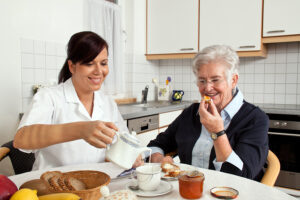How to Make Mealtime Safer and More Enjoyable for Seniors

Personal Care at Home in East Brunswick NJ
For some seniors, mealtime doesn’t feel like a fun or safe experience. Skipping meals isn’t an option, and family caregivers can do a lot to help the seniors they love to eat healthy meals safely. Getting help from personal care at home is one way to ensure that seniors are getting the help that they need with meals and other daily activities.
Plan Meals Ahead of Time
Planning meals ahead of time is a great way to ensure that seniors eat a well-balanced and nutritious diet as often as possible. When planning meals, consider dietary restrictions, food preferences, and medical conditions that might make eating more difficult. Seniors who have trouble swallowing or chewing may require special diets, such as pureed or soft foods. Planning ahead for those needs is essential.
Use Adaptive Utensils
Seniors who have trouble holding eating utensils or who have limitations with hand mobility might benefit from using adaptive utensils. These types of utensils might have angled or larger handles, which make them a lot easier to grip and use. Some utensils might have special weights in the handles to offer additional stability for people who might experience a weaker grip or tremors.
Make Sure the Environment is Safe
Environment plays into mealtime safety, too. The dining area needs to be lit well and free of any obstacles that might present tripping hazards. Home care providers can be extremely helpful in spotting any potential safety issues and helping seniors to correct them. They can also help quite a bit in keeping the home neat and safe.
Consider Mealtime Assistance
Seniors who need extra help eating can benefit from the help of personal care at home. Caregivers offer assistance with meal preparation and cleanup, but also with feeding seniors who are unable to feed themselves. For seniors who have trouble swallowing or chewing, speech therapists can help them to practice exercises that make both easier.
Offer Finger Foods
For seniors who have trouble using utensils at all or who have limited dexterity, finger foods might be the answer. This might be something that family caregivers don’t think about when planning meals, but there are lots of ways to make finger foods nutritional and delicious. Offering a variety of options makes mealtime more enjoyable and engaging. It can also make eating safer for seniors who have trouble eating.
Make Mealtime Social
Mealtime can also be an opportunity for socialization and engagement. Eating with others helps to prevent loneliness and depression while providing a sense of community. Personal care at home offers an aspect of socialization to meals while also offering practical assistance. Caregivers really get to know the people they’re helping, which makes it a lot easier for them to get to know preferences and needs.
Meals can be stressful and challenging for aging adults who have trouble eating. They’re even more difficult if seniors live on their own. Personal care at home can be a huge help for aging adults. Caregivers offer a lot of hands-on help, along with some careful planning from family caregivers.
If you or an aging loved one is considering personal care at home in East Brunswick, NJ, please contact the caring staff at Care Street Home Care today. Call (732) 607-8870.
- Signs Your Senior Parent Needs Home Care Assistance - January 17, 2025
- Hearing Rehabilitation: Empowering Seniors for Better Living - January 10, 2025
- Understanding How Cartilage Changes Over the Years - January 3, 2025
